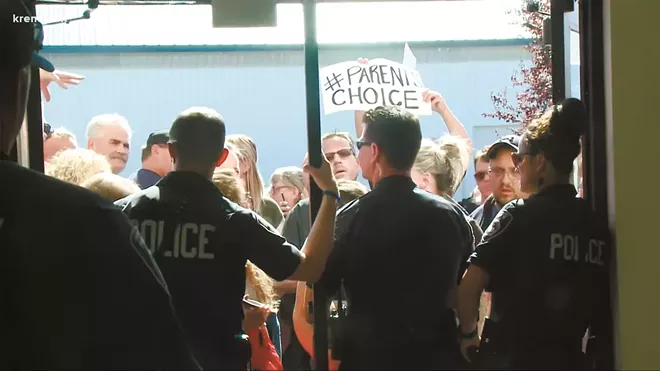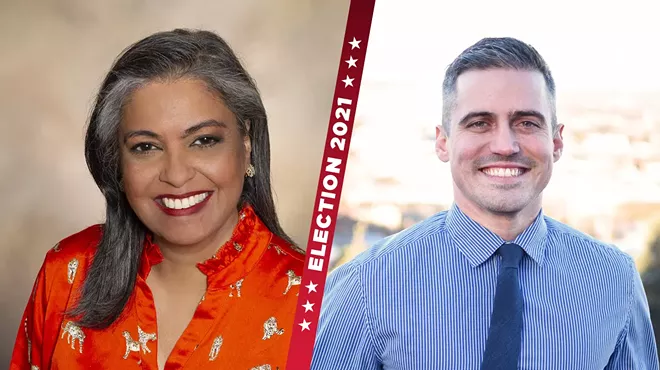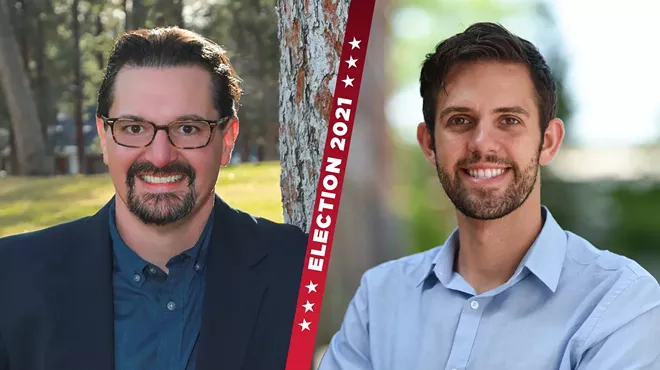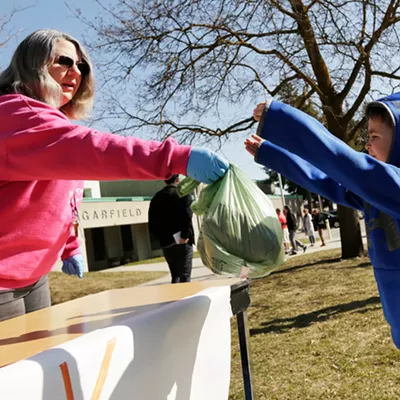Two weeks ago, Debbie Long — Central Valley School Board president — checked her Facebook and found a message that shook her to her core. The message, from a woman Long does not know, called Long a "lying-ass Democrat," a "B——" and a "C—-," vulgar words typically used against women we won't print fully here. She threatened to follow Long and her "endeavors" and recruit others to take her down.
"Americans WILL prevail and traitors like yourself... will be no more," the message says.
Long felt threatened. She reported the message to the school district attorney, who turned it over to the Spokane County Sheriff's Office, she says.
But for Long, it's not just the message itself that bothers her. The message is just one more element of toxicity towards the school board — not only in Central Valley, but across the country.
Anti-mask and anti-vaccine protesters are storming into school board meetings, often shutting them down due to their refusal to mask up — as happened in Central Valley. Members of the public have actually filed a recall petition trying to recall Long and two other board members over their handling of mask and vaccine mandates (which are out of the local board's control).
In Coeur d'Alene, two school board members resigned earlier this month after anti-mask protesters — banging on the doors and shouting outside a scheduled board meeting about masks — forced the meeting to be canceled. The National School Boards Association has even asked for federal assistance due to nationwide threats.
Long has been on the Central Valley board for 18 years and would be up for re-election in two years. But she won't run again, she says.
"I think we've done a lot of good things for Central Valley School District, and it's been an honor to serve," she says. "But I will never run again. This has put my family and me through it. It's unbelievable."
So who does want to run for school board? Across the Inland Northwest, dozens of candidates have thrown their name in.
In Post Falls, for example, board member JAKE DAWSON faces anti-Semitic alt-right troll DAVID REILLY, who attended the 2017 white nationalist rally in Charlottesville and has said on social media that "all Jews are dangerous," according to the Daily Beast.
Reilly's racist views aren't representative of every conservative candidate running for school board. But many candidates, including Reilly, have united around the two issues making school boards so contentious right now: Opposition to mask mandates and critical race theory.
Here, we'll take a look at how that plays out in Spokane and Central Valley school board races.

CRITICAL RACE THEORY
Local schools, from Idaho to Washington, insist that they do not teach critical race theory, an academic framework that contends that race is a social construct that has been used historically to oppress people of color, is embedded in every part of society and must be actively uprooted.But PAM OREBAUGH, a candidate for Central Valley School District, isn't convinced. She says students are being politically indoctrinated. When asked for evidence that critical race theory is being taught, Orebaugh — a nurse educator at Washington State University who stresses she's not speaking for the university — says that she hears that schools are teaching "unbalanced history" and that White people should apologize to Native Americans.
MEET THE CANDIDATES
SPOKANE SCHOOL BOARD, POSITION 3
MELISSA BEDFORD, former elementary teacher, current education professor at Eastern Washington University. DARYL GEFFKEN, a financial planner at D.A. Davidson.
SPOKANE SCHOOL BOARD, POSITION 4
KATA DEAN, advocate working with drug and alcohol addicted teens. RILEY SMITH, nonprofit worker, former campaign manager and Spokane City Council legislative assistant.
CENTRAL VALLEY SCHOOL BOARD, DISTRICT 5
PAM OREBAUGH, Washington State University nurse educator. STAN CHALICH, retired teacher at Central Valley High School. ROB LINEBARGER, on the ballot, has thrown his support to Orebaugh.
COEUR D'ALENE SCHOOL BOARD, ZONE 1
LISA MAY, incumbent and former critical care nurse. ALLIE ANDERTON, parent concerned about critical race theory and advocating for minimal government involvement in education.
COEUR D'ALENE SCHOOL BOARD, ZONE 4
LINDSEY SWINGROVER, school psychologist. LESLI BJERKE, small business owner and member of the John Birch Society.
COEUR D'ALENE SCHOOL BOARD, ZONE 5
REBECCA SMITH, incumbent and associate director of Lutherhaven Ministries. GLEN CAMPBELL, radio personality for Today's Christian Country.
— Wilson Criscione
Orebaugh also claimed to the Inlander that she had proof that critical race theory books were in Central Valley schools. Asked to show the proof, she sent the Inlander pictures of a variety of books allegedly found at Ridgeline High School, with topics including Chinese mythology, Islam and LGBT rights. Some books did appear to discuss race and Black Lives Matter and could possibly discuss elements of critical race theory. But there was no evidence that the books were being taught in classrooms — they were simply in the library.
Is Orebaugh arguing to ban those books from the library? She says no, just that "both sides" need to be taught.
"If books on these religions are there, then other religions must also be represented," she says. "When you limit knowledge or access to other views, you are in effect promoting that one viewpoint."
On the ballot, Orebaugh's opponent is Rob Linebarger, who is part of the recall petition against Long and two other board members. But Linebarger has supported Orebaugh, so her real opponent is a write-in candidate, STAN CHALICH.
Chalich, who taught in Central Valley for 49 years, says he's running because the district is "under siege" from a "small group of loud, angry extremists." He says he's been on book review committees, and he stresses that good teachers present history "objectively, not subjectively."
Orebaugh says she's not some radical, despite what her opponent may say.
"I want high-quality basic education, free of political indoctrination," she says. "I'm not trying to turn schools into Christian schools. Schools need to be a safe place for all of our students."
KATA DEAN, candidate for Spokane Public Schools board of directors, says her own daughter was taught critical race theory at Ferris High School. She declined to discuss the lesson with the Inlander to protect her daughter's privacy, but she says it made her not trust schools when they deny teaching critical race theory.
Dean says she just wants "accurate history" to be taught, and she says that may mean more history about people of color.
According to a survey conducted by conservative Christian group We Believe We Vote, Dean "strongly agrees" with the notion that public schools should "teach the controversy" regarding the origins of life and also that schools should teach different theories on climate change. And while she's campaigned against critical race theory, she tells the Inlander that she'd be open to teaching multiple points of view on race as well.
Does that mean Dean might actually be OK with something like critical race theory taught in the right context? She pauses for several seconds when asked this.
"It would be worth exploring and having these discussions," Dean says, finally. "And that's exactly what needs to be done with all of these — we need to have these discussions to get on the same page."
DARYL GEFFKEN, a conservative-leaning school board candidate for the other open Spokane Public School seat, also has concerns about critical race theory, saying "fighting racism with racism is wrong." His opponent, MELISSA BEDFORD, is a former teacher and has reiterated that it is not being taught in public schools.
Yet even the more liberal RILEY SMITH, Dean's opponent, doesn't think critical race theory needs to be taught in schools. He blames polarization in national media for it becoming such a hot-button issue.
"I don't think we should be teaching a graduate-level framework," he says. "I do think we should talk about anti-racist education in our schools that is age appropriate."
COVID-19 RESTRICTIONS
On masks and vaccines, both Bedford and Smith, running for different Spokane seats, have said they would listen to health professionals on COVID-19 restrictions. Smith says the most important thing is that students are back in school full-time, as they are now, and that they are safe."The way we have been able to do that is wearing masks in schools," Smith says.
Chalich, the write-in Central Valley candidate, says the mask and a possible vaccine mandate are decisions left up to the state, and he wouldn't want to do anything to risk funding.
"It's the responsibility of the governor and the state to regulate public health and safety," he says.
Dean says she's against the mask mandate, but says there's "nothing I can do" about it. Still, she says she wants children in school, and in order to do that, kids need to mask up. Geffken is mostly on the same page with that.
"It's unfortunate it has to be a mandate," Geffken tells the Inlander. "But it's not the hill to die on."
Orebaugh, the nurse working at WSU, says she is strongly opposed to mask mandates and vaccine mandates. On masks, she's not convinced that they work. On vaccines, she says health care laws "protect us from forced treatment."
When asked about vaccines already required for kids for many years without much controversy, like for measles, she tells the Inlander that she would be OK with some vaccine requirements as long as students had the ability to opt out if they choose.
"I guarantee a vaccine mandate in our district is going to cause a lot more of an uproar," she says.
As a board member, Orebaugh says she wouldn't have the district push back against state mandates to the point that funds are withheld. But she would push for more local control. And that may depend, she says, on other school districts in the area also pushing back against the state — something that could be more likely depending on the results of the election.
"If we were all to be a united front, to say Eastern Washington is not Seattle and we want decisions for Eastern Washington," Orebaugh says, "I think that would have a greater impact." ♦
This story has been updated online to correct which candidate is opposing David Reilly for Post Falls School Board.
Confused by the "advisory votes" in the front of your ballot? You're not alone. State Rep. Marcus Riccelli (D-Spokane) says he gets more questions from stressed-out voters about these than about candidates.
Blame (or credit) a 2007 initiative championed by anti-tax crusader Tim Eyman. Initiative 960's two-thirds majority requirement for raising taxes was long ago struck down as unconstitutional, but another provision, requiring non-binding "advisory votes" be placed on the ballot any time taxes are raised or a tax break is closed, lingered on.
Since they're at the front of the ballot, Riccelli says sometimes "people don't end up going through the whole ballot, because they're exhausted with the advisory votes." Some legislators want to do away with them entirely. Riccelli, at the very minimum, supports moving them to the end.
And the legislature doesn't really pay attention to the outcome, says state Senate Majority Leader Andy Billig (D-Spokane), because they know the arguments for and against the tax aren't generally represented.
Since the votes are non-binding, you can feel free to skip them. Otherwise, you'll be faced with weighing in on three different Olympia-passed measures. One is a phone tax that the legislature already passed to fund suicide prevention hotlines. Another is a tax on certain types of alternatives to insurance — it's complicated, but was supported by every single member of the legislature but one. The big one is Advisory Vote 37: The state passed an entirely new form of taxation — the capital gains tax — to fund education and child care.
There's a big legal battle over whether that capital gains tax is legal under Washington's state constitution. If it goes before a panel of state supreme court justices, their votes, at least, won't just be advisory.
— DANIEL WALTERS




























